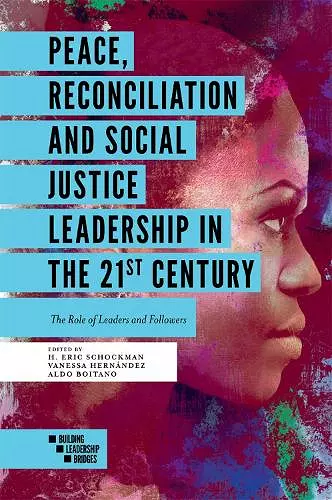Peace, Reconciliation and Social Justice Leadership in the 21st Century
The Role of Leaders and Followers
H Eric Schockman editor Aldo Boitano editor Vanessa Hernández editor
Format:Paperback
Publisher:Emerald Publishing Limited
Published:23rd Sep '19
Should be back in stock very soon

Conflicts and violence, repression and oppression have always been part of the world, resulting in situations where no one really wins and leading to stalemates that cause the degradation of economic order – and of the human condition. Whether conflicts can be won or not, the human cost must be addressed when building a lasting peace, and this role falls now to our future leaders and followers. In Peace, Reconciliation and Social Justice Leadership in the 21st Century, expert contributors explore the ways in which leaders and followers can bring forth pacifism, peace building, nonviolence, forgiveness and social cooperation. The chapters focus on the role of positive public policies on the national and international order, and the role leadership and followership plays in harmonizing differences and personifying space. They include lessons learned from post-conflict societies in Rwanda, Sri Lanka, Bosnia-Herzegovina, Chile, and others to remind us all that peace is a collective endeavour where no one can take a back seat.
Bringing together leading scholars and practitioners from the worlds of leadership, followership, transitional justice, and international law, this research provides a blueprint of how people-led, bottom-up, grassroots efforts can foster reconciliation and a more peaceful world.
In all my years as a public servant, I have always looked for guideposts to help me better understand a fractured world. This outstanding interdisciplinary volume provides an excellent roadmap to piece together the mosaic of peace, reconciliation, and social justice not just from a leader’s perspective, but from the voices and actions of followers. This book forms an essential praxis through the lens of gender, diversity, spirituality, inclusiveness to better deal with global restoration of a more beloved community. -- Ambassador Eric M. Bost (Ret), Former US Ambassador to the Republic of South Africa; Deputy Director of the Borlaug Institute for International Agriculture and Development at Texas A&M University
In this ambitious interdisciplinary volume, the authors seek to understand the concept of peace and reconciliation through leadership and followership theories and practice from the current generation’s perspective in the midst of today’s turbulent and unsettling times. The immediate need for this global analysis of peace and reconciliation from a trans-disciplinary lens is crucial. The authors of this volume provide a solution through the concept of decolonization by first giving a voice to those most impacted by conflict and then by listening to those voices in order to bring about social justice. -- Raida Gatten, Associate VP of Academic Affairs, Woodbury University
At a time when the global order founded by liberal democracies is in retreat, beset by authoritarian rivals on one side and failing states on the other, academia might be ready for the tonic of a “peace and conflict studies” approach to the study of leadership – leading to an understanding of the moral, spiritual, and political roles of leaders in healing a divided society. This book lays the groundwork. -- Michael Woo, Dean, College of Environmental Design, California State Polytechnic University, Pomona
Social oppression, civil war, and state genocide are often a direct product of leadership failures, but recovery from them can be facilitated by other leaders and even followers who appreciate and exercise the powers of truth telling, community reconciliation, and national rebuilding. H. Eric Schockman, Vanessa Hernández, and Aldo Boitano have gathered a host of penetrating and informative accounts of just that in Peace, Reconciliation, and Social Justice in the 21st Century, which serves as both an inspiration and a roadmap for those whose wish to apply their own leadership to recovering and coming back from human calamities. -- Michael Useem, Professor of Management, Wharton School, University of Pennsylvania, and author of Leadership Dispatches: Chile’s Extraordinary Comeback from Disaster.
An excellent view of the study of leadership and a just world order, the book provides a trans-disciplinary approach to issues of equity, inclusion, and trust. The building of sustainable peace is basic to the text as each chapter examines the themes of reconciliation, community building, international law, and social justice. This book is important and I give it my highest recommendation. -- Dr. June Schmieder-Ramirez, Chair, PhD in Global Leadership and Change, Chair of Leadership Studies, Pepperdine University
Contributors to this book include academics and practitioners in international law, social justice, leadership studies, conflict studies, international studies, and international human rights; many are practitioners in social justice and reconciliation initiatives around the world. In their papers on reconciliation, community building, international law, and peacebuilding, they present issues and ideas for both leaders and followers, centering on the positive impact of public policies on national and international order. Case studies detail experiences in post-conflict societies including Rwanda, Uganda, Sri Lanka, Indonesia, Bosnia-Herzegovina, and Chile. Many of the papers offer profiles of women peacemakers and deal with the importance of women’s activism, women’s economic empowerment, and reparation for survivors of conflict-related sexual violence. Distributed in North America by Turpin distribution. -- Annotation ©2019 * (protoview.com) *
ISBN: 9781838671969
Dimensions: 229mm x 152mm x 22mm
Weight: 407g
344 pages